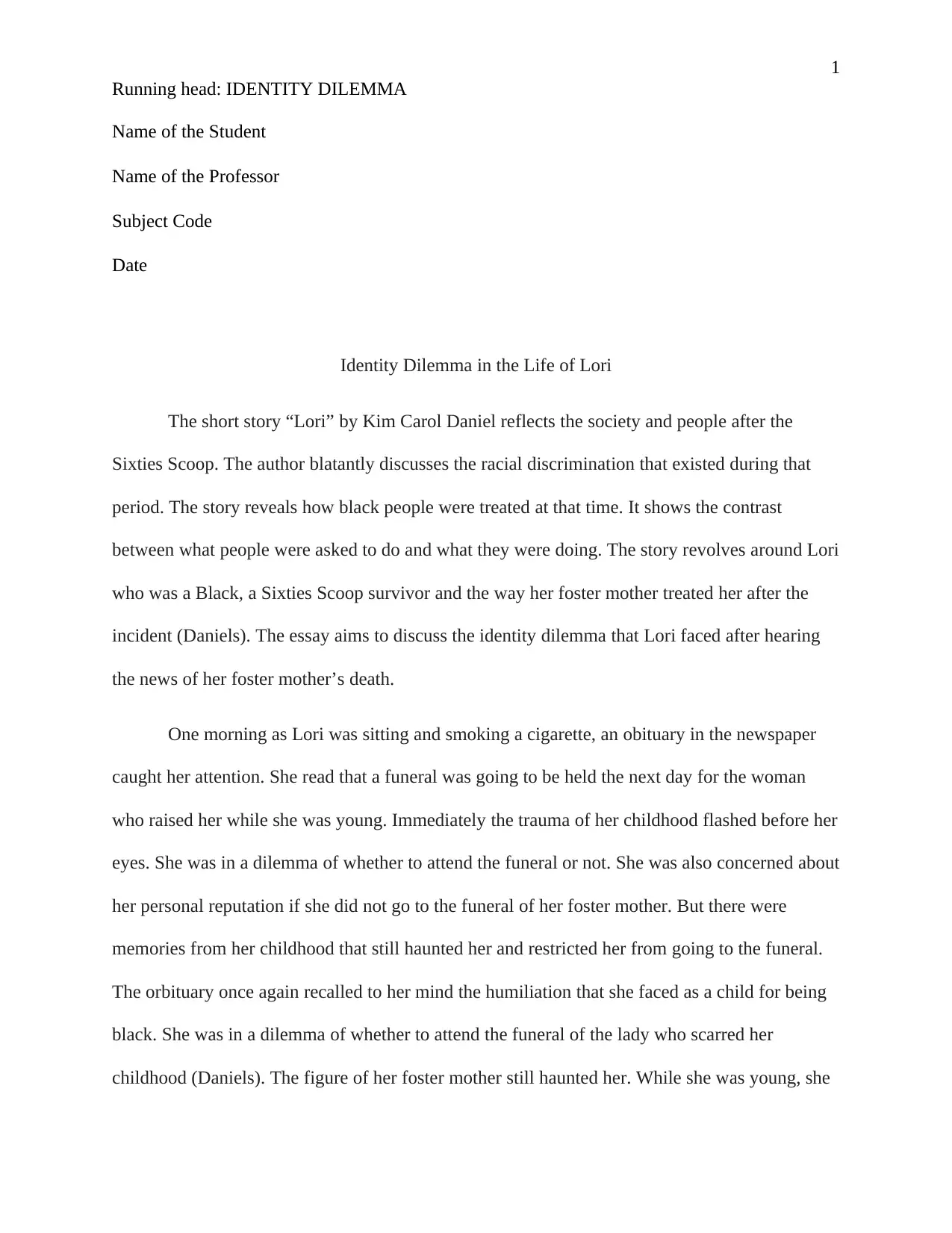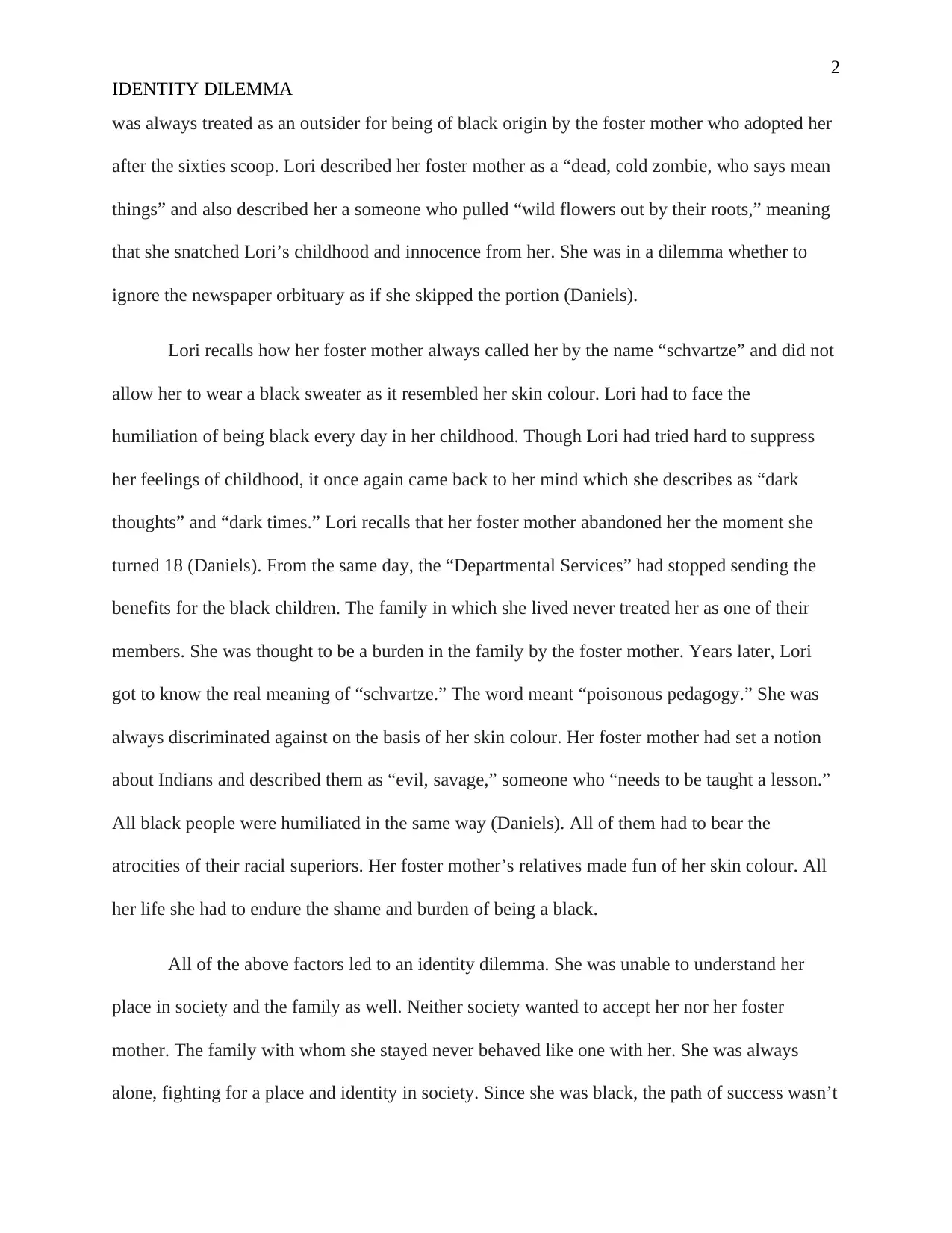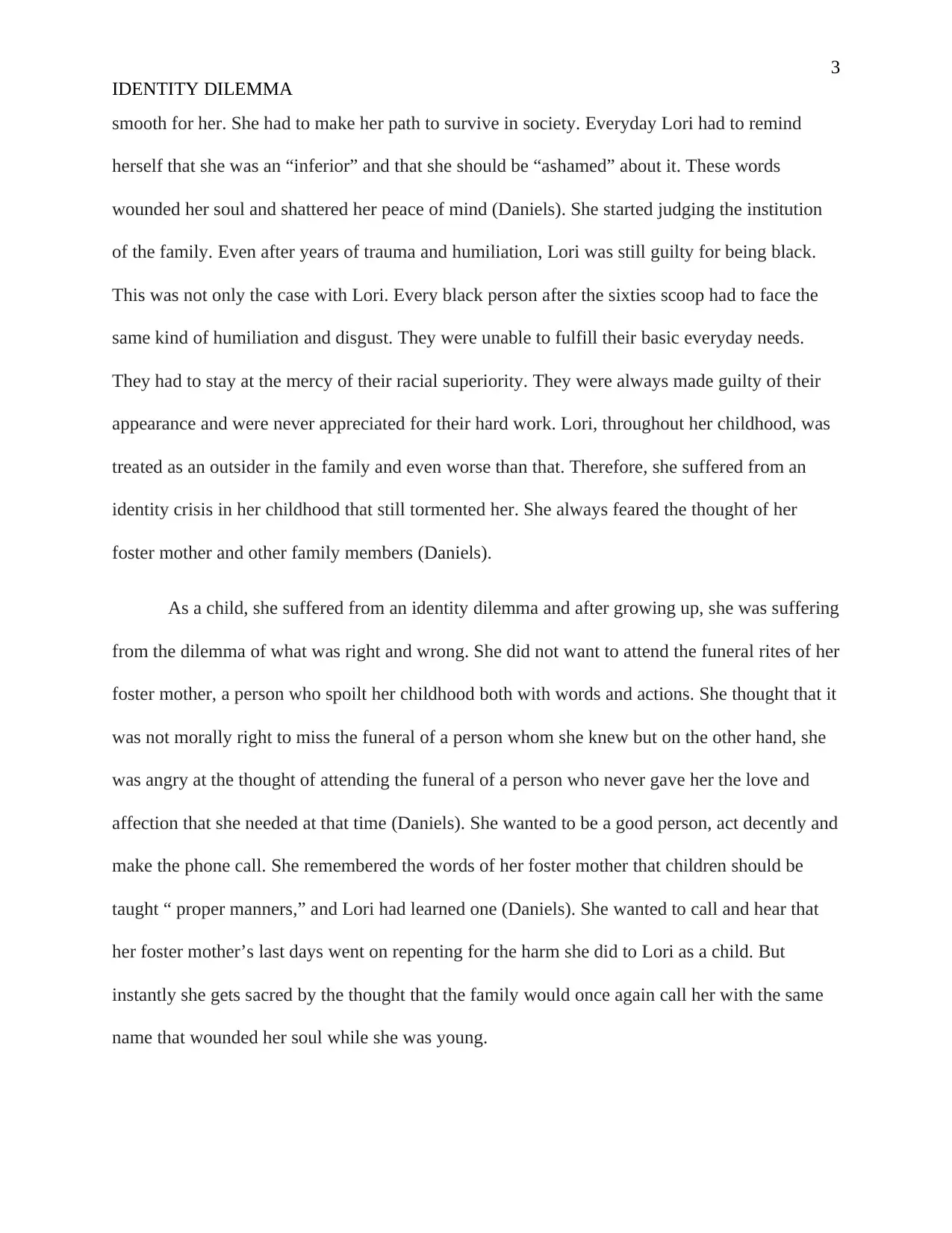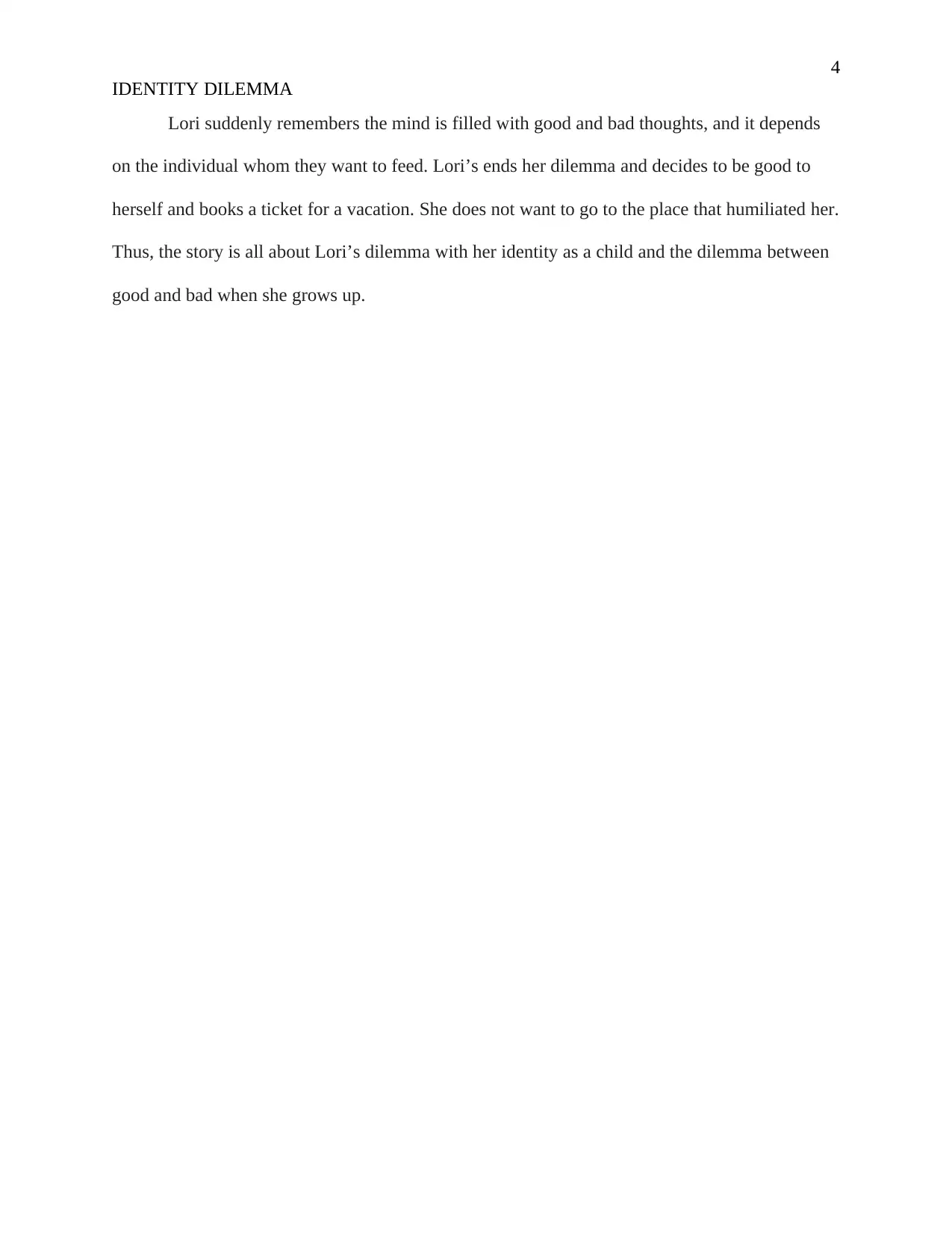Identity Crisis and Trauma in 'Lori' by Kim Carol Daniel: An Essay
VerifiedAdded on 2022/08/17
|6
|1250
|34
Essay
AI Summary
This essay delves into the identity dilemma experienced by Lori, a character in Kim Carol Daniel's short story, which reflects the societal impact of the Sixties Scoop and racial discrimination. The narrative focuses on Lori's internal conflict following her foster mother's death and the memories of childho...

1
Running head: IDENTITY DILEMMA
Name of the Student
Name of the Professor
Subject Code
Date
Identity Dilemma in the Life of Lori
The short story “Lori” by Kim Carol Daniel reflects the society and people after the
Sixties Scoop. The author blatantly discusses the racial discrimination that existed during that
period. The story reveals how black people were treated at that time. It shows the contrast
between what people were asked to do and what they were doing. The story revolves around Lori
who was a Black, a Sixties Scoop survivor and the way her foster mother treated her after the
incident (Daniels). The essay aims to discuss the identity dilemma that Lori faced after hearing
the news of her foster mother’s death.
One morning as Lori was sitting and smoking a cigarette, an obituary in the newspaper
caught her attention. She read that a funeral was going to be held the next day for the woman
who raised her while she was young. Immediately the trauma of her childhood flashed before her
eyes. She was in a dilemma of whether to attend the funeral or not. She was also concerned about
her personal reputation if she did not go to the funeral of her foster mother. But there were
memories from her childhood that still haunted her and restricted her from going to the funeral.
The orbituary once again recalled to her mind the humiliation that she faced as a child for being
black. She was in a dilemma of whether to attend the funeral of the lady who scarred her
childhood (Daniels). The figure of her foster mother still haunted her. While she was young, she
Running head: IDENTITY DILEMMA
Name of the Student
Name of the Professor
Subject Code
Date
Identity Dilemma in the Life of Lori
The short story “Lori” by Kim Carol Daniel reflects the society and people after the
Sixties Scoop. The author blatantly discusses the racial discrimination that existed during that
period. The story reveals how black people were treated at that time. It shows the contrast
between what people were asked to do and what they were doing. The story revolves around Lori
who was a Black, a Sixties Scoop survivor and the way her foster mother treated her after the
incident (Daniels). The essay aims to discuss the identity dilemma that Lori faced after hearing
the news of her foster mother’s death.
One morning as Lori was sitting and smoking a cigarette, an obituary in the newspaper
caught her attention. She read that a funeral was going to be held the next day for the woman
who raised her while she was young. Immediately the trauma of her childhood flashed before her
eyes. She was in a dilemma of whether to attend the funeral or not. She was also concerned about
her personal reputation if she did not go to the funeral of her foster mother. But there were
memories from her childhood that still haunted her and restricted her from going to the funeral.
The orbituary once again recalled to her mind the humiliation that she faced as a child for being
black. She was in a dilemma of whether to attend the funeral of the lady who scarred her
childhood (Daniels). The figure of her foster mother still haunted her. While she was young, she
Paraphrase This Document
Need a fresh take? Get an instant paraphrase of this document with our AI Paraphraser

2
IDENTITY DILEMMA
was always treated as an outsider for being of black origin by the foster mother who adopted her
after the sixties scoop. Lori described her foster mother as a “dead, cold zombie, who says mean
things” and also described her a someone who pulled “wild flowers out by their roots,” meaning
that she snatched Lori’s childhood and innocence from her. She was in a dilemma whether to
ignore the newspaper orbituary as if she skipped the portion (Daniels).
Lori recalls how her foster mother always called her by the name “schvartze” and did not
allow her to wear a black sweater as it resembled her skin colour. Lori had to face the
humiliation of being black every day in her childhood. Though Lori had tried hard to suppress
her feelings of childhood, it once again came back to her mind which she describes as “dark
thoughts” and “dark times.” Lori recalls that her foster mother abandoned her the moment she
turned 18 (Daniels). From the same day, the “Departmental Services” had stopped sending the
benefits for the black children. The family in which she lived never treated her as one of their
members. She was thought to be a burden in the family by the foster mother. Years later, Lori
got to know the real meaning of “schvartze.” The word meant “poisonous pedagogy.” She was
always discriminated against on the basis of her skin colour. Her foster mother had set a notion
about Indians and described them as “evil, savage,” someone who “needs to be taught a lesson.”
All black people were humiliated in the same way (Daniels). All of them had to bear the
atrocities of their racial superiors. Her foster mother’s relatives made fun of her skin colour. All
her life she had to endure the shame and burden of being a black.
All of the above factors led to an identity dilemma. She was unable to understand her
place in society and the family as well. Neither society wanted to accept her nor her foster
mother. The family with whom she stayed never behaved like one with her. She was always
alone, fighting for a place and identity in society. Since she was black, the path of success wasn’t
IDENTITY DILEMMA
was always treated as an outsider for being of black origin by the foster mother who adopted her
after the sixties scoop. Lori described her foster mother as a “dead, cold zombie, who says mean
things” and also described her a someone who pulled “wild flowers out by their roots,” meaning
that she snatched Lori’s childhood and innocence from her. She was in a dilemma whether to
ignore the newspaper orbituary as if she skipped the portion (Daniels).
Lori recalls how her foster mother always called her by the name “schvartze” and did not
allow her to wear a black sweater as it resembled her skin colour. Lori had to face the
humiliation of being black every day in her childhood. Though Lori had tried hard to suppress
her feelings of childhood, it once again came back to her mind which she describes as “dark
thoughts” and “dark times.” Lori recalls that her foster mother abandoned her the moment she
turned 18 (Daniels). From the same day, the “Departmental Services” had stopped sending the
benefits for the black children. The family in which she lived never treated her as one of their
members. She was thought to be a burden in the family by the foster mother. Years later, Lori
got to know the real meaning of “schvartze.” The word meant “poisonous pedagogy.” She was
always discriminated against on the basis of her skin colour. Her foster mother had set a notion
about Indians and described them as “evil, savage,” someone who “needs to be taught a lesson.”
All black people were humiliated in the same way (Daniels). All of them had to bear the
atrocities of their racial superiors. Her foster mother’s relatives made fun of her skin colour. All
her life she had to endure the shame and burden of being a black.
All of the above factors led to an identity dilemma. She was unable to understand her
place in society and the family as well. Neither society wanted to accept her nor her foster
mother. The family with whom she stayed never behaved like one with her. She was always
alone, fighting for a place and identity in society. Since she was black, the path of success wasn’t

3
IDENTITY DILEMMA
smooth for her. She had to make her path to survive in society. Everyday Lori had to remind
herself that she was an “inferior” and that she should be “ashamed” about it. These words
wounded her soul and shattered her peace of mind (Daniels). She started judging the institution
of the family. Even after years of trauma and humiliation, Lori was still guilty for being black.
This was not only the case with Lori. Every black person after the sixties scoop had to face the
same kind of humiliation and disgust. They were unable to fulfill their basic everyday needs.
They had to stay at the mercy of their racial superiority. They were always made guilty of their
appearance and were never appreciated for their hard work. Lori, throughout her childhood, was
treated as an outsider in the family and even worse than that. Therefore, she suffered from an
identity crisis in her childhood that still tormented her. She always feared the thought of her
foster mother and other family members (Daniels).
As a child, she suffered from an identity dilemma and after growing up, she was suffering
from the dilemma of what was right and wrong. She did not want to attend the funeral rites of her
foster mother, a person who spoilt her childhood both with words and actions. She thought that it
was not morally right to miss the funeral of a person whom she knew but on the other hand, she
was angry at the thought of attending the funeral of a person who never gave her the love and
affection that she needed at that time (Daniels). She wanted to be a good person, act decently and
make the phone call. She remembered the words of her foster mother that children should be
taught “ proper manners,” and Lori had learned one (Daniels). She wanted to call and hear that
her foster mother’s last days went on repenting for the harm she did to Lori as a child. But
instantly she gets sacred by the thought that the family would once again call her with the same
name that wounded her soul while she was young.
IDENTITY DILEMMA
smooth for her. She had to make her path to survive in society. Everyday Lori had to remind
herself that she was an “inferior” and that she should be “ashamed” about it. These words
wounded her soul and shattered her peace of mind (Daniels). She started judging the institution
of the family. Even after years of trauma and humiliation, Lori was still guilty for being black.
This was not only the case with Lori. Every black person after the sixties scoop had to face the
same kind of humiliation and disgust. They were unable to fulfill their basic everyday needs.
They had to stay at the mercy of their racial superiority. They were always made guilty of their
appearance and were never appreciated for their hard work. Lori, throughout her childhood, was
treated as an outsider in the family and even worse than that. Therefore, she suffered from an
identity crisis in her childhood that still tormented her. She always feared the thought of her
foster mother and other family members (Daniels).
As a child, she suffered from an identity dilemma and after growing up, she was suffering
from the dilemma of what was right and wrong. She did not want to attend the funeral rites of her
foster mother, a person who spoilt her childhood both with words and actions. She thought that it
was not morally right to miss the funeral of a person whom she knew but on the other hand, she
was angry at the thought of attending the funeral of a person who never gave her the love and
affection that she needed at that time (Daniels). She wanted to be a good person, act decently and
make the phone call. She remembered the words of her foster mother that children should be
taught “ proper manners,” and Lori had learned one (Daniels). She wanted to call and hear that
her foster mother’s last days went on repenting for the harm she did to Lori as a child. But
instantly she gets sacred by the thought that the family would once again call her with the same
name that wounded her soul while she was young.
⊘ This is a preview!⊘
Do you want full access?
Subscribe today to unlock all pages.

Trusted by 1+ million students worldwide

4
IDENTITY DILEMMA
Lori suddenly remembers the mind is filled with good and bad thoughts, and it depends
on the individual whom they want to feed. Lori’s ends her dilemma and decides to be good to
herself and books a ticket for a vacation. She does not want to go to the place that humiliated her.
Thus, the story is all about Lori’s dilemma with her identity as a child and the dilemma between
good and bad when she grows up.
IDENTITY DILEMMA
Lori suddenly remembers the mind is filled with good and bad thoughts, and it depends
on the individual whom they want to feed. Lori’s ends her dilemma and decides to be good to
herself and books a ticket for a vacation. She does not want to go to the place that humiliated her.
Thus, the story is all about Lori’s dilemma with her identity as a child and the dilemma between
good and bad when she grows up.
Paraphrase This Document
Need a fresh take? Get an instant paraphrase of this document with our AI Paraphraser

5
IDENTITY DILEMMA
Works Cited
Daniels, Carol. Lori. Cree Chipewyan, 1963.
IDENTITY DILEMMA
Works Cited
Daniels, Carol. Lori. Cree Chipewyan, 1963.

6
IDENTITY DILEMMA
IDENTITY DILEMMA
⊘ This is a preview!⊘
Do you want full access?
Subscribe today to unlock all pages.

Trusted by 1+ million students worldwide
1 out of 6
Your All-in-One AI-Powered Toolkit for Academic Success.
+13062052269
info@desklib.com
Available 24*7 on WhatsApp / Email
![[object Object]](/_next/static/media/star-bottom.7253800d.svg)
Unlock your academic potential
© 2024 | Zucol Services PVT LTD | All rights reserved.

